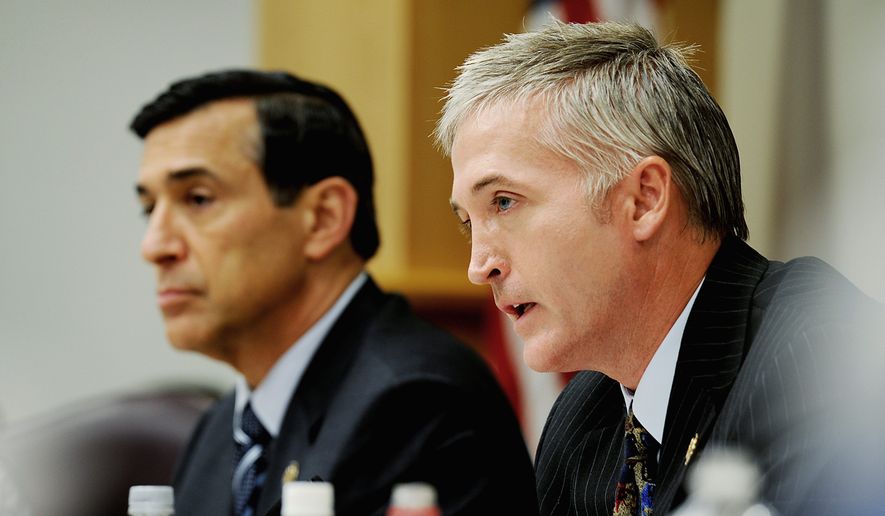NORTH CHARLESTON, S.C. — The National Labor Relations Board’s bid to prevent Boeing from moving to South Carolina could harm the very state it is trying to protect by discouraging businesses from setting up shop there, Republican lawmakers warn.
A Washington state union has persuaded the NLRB to fight to bring work back from the plant that Boeing Co., the world’s largest aerospace manufacturer, has built here.
But a victory for the labor board would create an unfriendly business environment and stifle economic growth in Washington state and across the country, Republicans say, and the uncertainty eventually could force American companies to do business overseas.
“New businesses won’t want to locate in union states, because the same thing that is happening to Boeing will happen to them,” Rep. Blake Farenthold, Texas Republican, said at a congressional field hearing. “It creates the impression that we don’t want to start up in those states, because once we grow up were stuck.”
This is shaping up to be one of the biggest labor disputes for the Obama administration. The NLRB filed its complaint against Boeing on April 20, charging unfair labor practices, and the court case started Tuesday in Seattle.
On Friday, members of the House Committee on Oversight and Government Relations, controlled by Republicans, traveled to South Carolina to investigate whether the NLRB had overstepped its authority by dictating where a private company can do business.
“If the NLRB had its way, then once you plant your flag in a union state, then you can never leave,” said Rep. Trey Gowdy, one of the three South Carolina Republicans at the hearing.
The NLRB’s top attorney told the committee that he is trying to create a fair workplace environment in all states by setting a precedent that companies cannot discriminate against unions.
“Boeing has every right to manufacture planes in South Carolina, or anywhere else for that matter,” Lafe Solomon, the agency’s acting general counsel, testified at the hearing, “as long as those decisions are based on legitimate business considerations.”
The NLRB charges that Boeing is punishing workers for past strikes in Puget Sound, Wash., by taking work out of state. The company called the move a sound business decision and pointed out that it has hired thousands of workers in Washington since it located in South Carolina.
The NLRB technically is not asking Boeing to close its South Carolina plant. Instead, the agency is asking Boeing to match the number of planes built in South Carolina with another plant in Washington state.
That order effectively would force the company to shut down South Carolina operations because of supply issues with the 787 Dreamliner that limit Boeing’s theoretical production to three more planes per month than it already is constructing, whether they are built in South Carolina or Washington.
That could cost this community more than 1,000 jobs that have been created in the past year and destroy about 3,000 more that are supposed to be added.
Those are only the jobs Boeing is creating directly. Bryan Derreberry, president of the Charleston Metro Chamber of Commerce, said every job that Boeing fills creates three to four local positions for suppliers.
“This has been very, very hard on all of us in South Carolina,” Mr. Gowdy said. “We need the work, we want the work, we’re hungry for the work.”
Mr. Solomon testified that he was sympathetic to the workers’ plight, but that didn’t change his mind about charging Boeing.
“These are difficult economic times, and I truly regret the anxiety this case has caused them and their families,” he said. “The issuance of the complaint was not intended to harm the workers of South Carolina, but rather to protect the rights of workers.”
His concerns were echoed by Rep. Dennis J. Kucinich, Ohio Democrat and committee member.
“It would be unfortunate if the people in South Carolina have to suffer,” he said at the hearing, “but it’s Boeing that should have that on their conscience.”
The harmful effects of the NLRB’s complaint against Boeing doesn’t end with South Carolina. It also could limit business investment in Washington state.
“Seattle’s economy may be hurt in the future,” warned the committee’s chairman, Rep. Darrell Issa, California Republican.
The impact also could spread beyond Washington state and South Carolina and “paralyze our nation’s economy,” South Carolina Attorney General Alan Wilson testified.
The uncertainty already is pushing American companies to consider relocating overseas, out of the NLRB’s reach, said the lawmakers from South Carolina.
“The last thing we need are signals to the largest job creators in America that they should run those jobs to another country,” said Rep. Tim Scott, a South Carolina Republican who was at the hearing and represents the area where the factory is located.
“Make no mistake: It is truly about whether we want American businesses doing business in America,” he said. “Or do we want to send more work to China?”
• Tim Devaney can be reached at tdevaney@washingtontimes.com.




Please read our comment policy before commenting.